Euripides’ Iphigenia is a difficult play to stage. Text heavy, as are most Greek classics, this play bears the additional burden of a dilemma that makes the contemporary audience recoil in horror and disbelief. It’s hard to sit politely in the theatre listening, much less empathizing with the hero, when reason and emotion want to shout out: Really, Agamemnon?! Are you seriously considering killing your daughter to appease the gods? What parent would knowingly, willingly, sacrifice a child just to win a war?
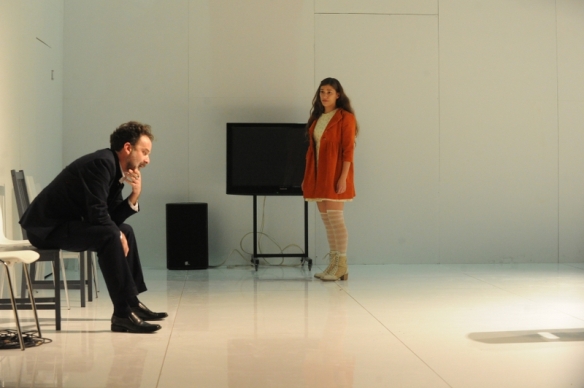
A little background: Agamemnon is stranded at Aulis with thousands of impatient troops waiting to set sail to Troy. The wind is not cooperating, and they turn to the seer Chalcas to learn what must be done to appease the gods and bring on the wind to fill their sails. Why attack Troy? To seek revenge and reclaim property. The property in question is Helen, yes, that Helen, the face that launch’d a thousand ships, estranged wife of Agamemnon’s brother Menelaus, abducted by Paris.
The Beer Sheva Theatre production of Iphigenia, in a new translation by Aharon Shabtai, directed by Gadi Rol, takes the tragedy into the age of over-exposure and the madness of media, with an intense examination of that crucial day, on the brink of the Trojan War. Set in an unspecified ultra-modern time, where doing the right thing is nowhere near as important as saying the right thing at the right time – all in front of the omni-present media and audiences everywhere.
Iphigenia captures the attention and imagination from the first, with its compelling visual concept. The set, designed by Dina Konson, is very striking: white walls and floor, punctuated by several white and black chairs (each different), four black microphones on stands, plasma screens and a video camera. The overhead track lighting, designed by Felice Ross, contributes to the ‘glare of the spotlights’ sensibility, as the cameras follow every word and gesture of the protagonists, complemented by close ups looming large on the screen. Completing the deliberately eclectic image are the costumes designed by Polina Adamov. Rank and hierarchy are conveyed with subtle nuances in cut and style, in a minimalist palette of black and white, a harsh elegance with one moment of soft innocence when Iphigenia first appears onstage in a light flowered dress and orange coat.
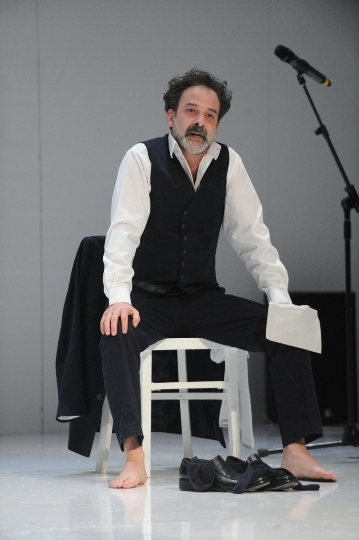
Position is everything in the world of power, and this translates into the composition and movement on the stage. You don’t need to know Ancient Greek to understand that Agamemnon (Amir Krief) is a man in trouble, from the first seconds of the play, as he hurtles across the stage in his skivvies, running into a chair and overturning it with a bang. The damage has already been done, even as he hastens into the contemporary robes of wealth and power, a three-piece suit.
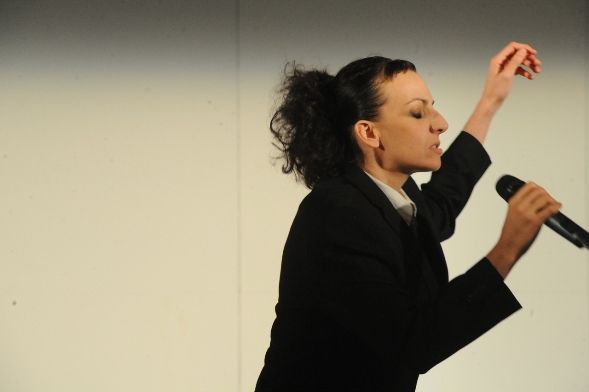
The soundscape of the play works its effect from that first crash, through the music, speech and silences. Original music and arrangements by Eldad Lidor, with keyboards, arrangements and musical direction by Elad Adar. The role of the chorus is performed here by crisply suited members of the press, singing their commentary, with Michal Weinberg performing admirably as the lead. From the 80s rock sound recalling Annie Lennox at her gender-bending best, to songs of love, the music conveys the mood, the pace and vibe contributing to the overall sense of mounting tension. Original compositions are seamlessly interwoven with other fragments. In one of the most moving sequences, Agamemnon speaks of the burden of power – “We are slaves of the mob we lead,/molded by the pomp we must show in public” – with music by contemporary Estonian composer Arvo Part in the background. While the text alone might invoke skepticism, the timbre of Krief’s voice, and the haunting beauty of the music convey the pain. Words are occasionally addressed directly to the microphone/audience, creating different levels of volume and intent. This is a world in which the identity of the listener is as important as, and perhaps even determines, what is said. The soundtrack is further punctuated at intervals by a sound like a metronome; marking time, its passage and disappearance.
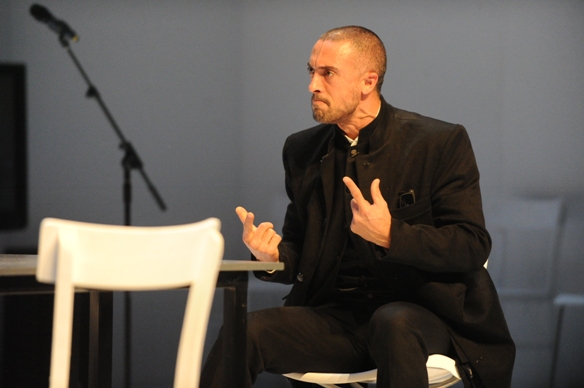
It is difficult to empathize with Agamemnon and his brother Menelaus (Nimrod Bergman), and difficult at times to comprehend the motives for their statements and actions. It is not only Agamemnon who vacillates, torn between two impossible options. Over the course of the play the two brothers display dramatic shifts: in one moment Menelaus is threatening Agamemnon, pushing him to sacrifice Iphigenia as promised, in the next, he seems to be pleading with him not to go through with it. The text alone does not offer many clues, yet director Gadi Rol seems to offer an intriguing suggestion. When Menelaus exhorts Agamemnon to renege on his promised sacrifice, he turns, not toward Agamemnon, but toward the camera. At the end of his speech, he makes the universal gesture, known to anyone who has ever heard the word newscast: CUT. It’s not a speech to a brother, it’s a speech to the camera, recorded digitally, perhaps to be broadcast at some later time as a moral defense, a technologically savvy way of saying: I was against this killing from the beginning.
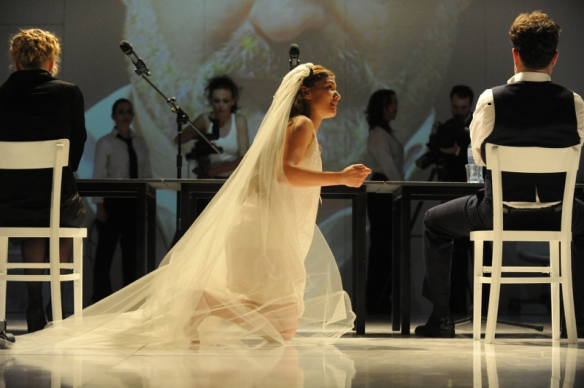
It is not a perfect production. The technology is a bit of a distraction at times, and while the giant close-ups of the family trio projected onto the wall in the climactic confrontation between Agamemnon, his wife Clytemnestra (Shiri Golan)and their daughter Iphigenia are very effective, the image itself could have been crisper. My main caveat is that Euripedes’ poetic text and Aharon Shabtai’s translation, not to mention the audience, are deserving of better diction. Diction is a weak point in Israeli theatre and the lack of clarity and nuanced speech is most keenly felt in ambitious productions such as this one. When Iphigenia (Gloris Bess) addresses her father, pleading for her life, emotion literally drowns her words making it almost impossible to understand her words. Yet later on, when she too performs a surprising change of heart, this young actress redeems herself in a very convincing portrayal of youth seduced by clouds of glory.
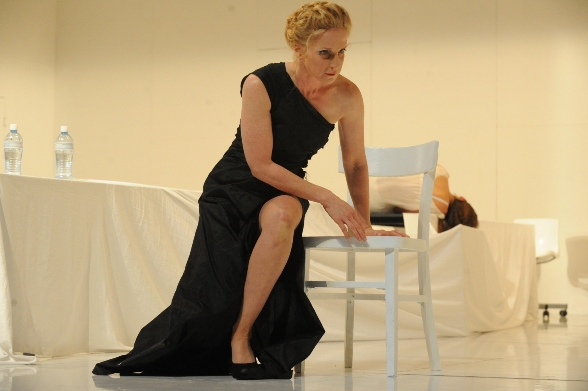
The three main protagonists as portrayed by Amir Krief, Shiri Golan and Nimrod Bergman, create a taut drama of opposing forces, making Iphigenia an emotionally intense experience. Much as one would want to revile Agamemnon, Krief conveys the pain the man endures, the image of his face, seared with pain, as his daughter pleas for her life, compels compassion, even for a man such as this. Shiri Golan’s portrayal of Clytemnestra, the rich man’s wife, perfectly attired in black, complete with the expected accoutrements: pearls, flask and pills, shimmers throughout. Ever conscious of her public persona and role in life, she exerts what power she can, using any means possible. By turns regal, seductive, imploring, wrathful, and despondent, Golan creates a Clytemnestra to remember. When she discovers Agamemnon’s intentions – “I have been deceived” – the serpentine anguish of her form, like a figure on a Greek vase, makes the heart ache.
Our hearts should ache, and they do, in this production that brings the classic tragedy to vivid life, examining the relationship between decision-makers and the media, asking once more, the question that Euripides asked so many years ago: What parent would knowingly, willingly, sacrifice a child just to win a war?






Comments are closed.